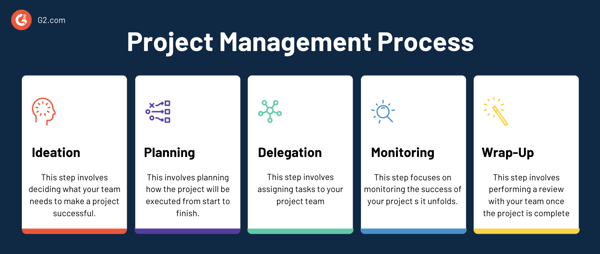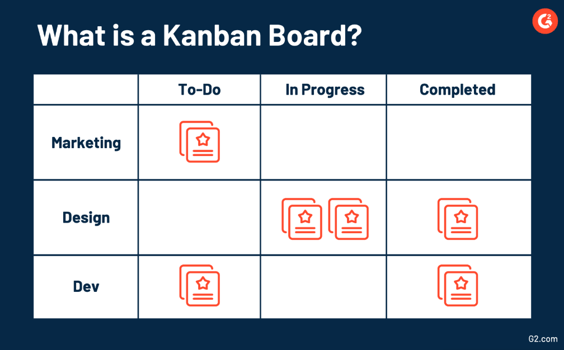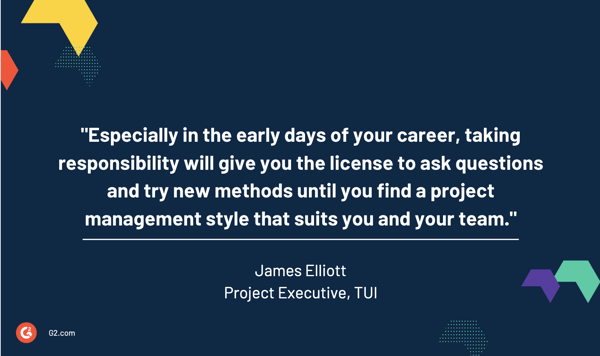

Most organizations have a 70 percent project failure rate. What are you doing to make sure you're not among those project managers who blow budgets and deadlines?
Anyone can have an idea, but not everyone can bring that idea to fruition. In business, the process of taking an idea and turning into a product or service has become an industry all on its own. Project management is what happens when dreams turn into reality.
Project management is the combined effort of practices and processes that drive a team to complete a project and meet specific goals. This is often done by a project manager who manages all of the information, deliverables, and project team members by directing the project from beginning to end.
It’s not a process that happens on its own. Hardworking project teams work under the fearless leadership of project managers who get the job done. The beauty and danger of project management are there are several roads on the path to success.
Whether you’re working on a high-performing team or one struggling to hit deadlines, there’s probably room to improve your project management strategy. Our guide will show you the ins and outs of both the industry and how to become a project manager.
Projects don’t just appear. They come to life because individuals have an idea for something that could improve business practices, increase revenue, satisfy customers, or solve business problems.
Every project starts with a big idea. It’s up to a project manager to take that idea through the five stages of project management: ideation, planning, delegation, monitoring, and wrap-up, to completion.

Ideation is where decision-makers sit down to discuss what the project is and what elements will be necessary to execute it. It's common to conduct a feasibility study during this time, with a goal of determining if it’s worth pursuing.
Even in the beginning ideation stages, it’s important to ask yourself and your team of decision-makers some initial questions:
Ideation will help expose potential issues before you get your team involved. It might seem tedious but it’s crucial you spend a lot of time in the ideation phase to ensure the project is possible before beginning.
Once you and your team have determined a project is worth pursuing, it’s time to begin planning. The planning phase is where you set your course and plan your route. It’s here that you really lay out the details of the project.
You should get your team involved in this part of the process. Your project team will know best who needs to be involved for a project to be successful. In this phase, you’re responsible for looking ahead to imagine what might be necessary for the project’s completion.
Ask yourself these questions:
The planning process could take weeks or even months to complete. You might even find that your project has no real deadline and the initiative is indefinite. In that case, you’ll still want to plan for the changes your team will work through.
Delegation is where employees actually begin to carry out the steps of the project. Once the idea has been approved and plans have been finalized, it’s time for the designated team to get to work! In this phase, you introduce the project or initiative to team members and clearly communicate your expectations.
This stage can often go awry because of poor communication or a lack of planning in the previous step. Team members want to do their jobs well, but this requires good leadership and direction. Additionally, you want to be sure everyone is on the same page. It can mess up the whole project to have various team members understand instructions differently.
When delegating steps to a project’s completion, consider having instructions in written form or providing visual examples of exactly what you’re looking for. The clearer your employees understand what you’re asking them to do, the more effectively they can carry out their roles.
Unless you’re tracking the success of your project as you’re working on it, there’s no way of knowing if the process is running smoothly. It’s the job of the project manager to keep an eye on the project as it runs.
Team members often see a project narrowly: they understand their part and play it well. Project managers have a broad perspective on the goings-on. They have their hands in everything, monitoring multiple moving parts.
A few factors that project managers are responsible for controlling include, but are not limited to:
A good project manager will track all of these things for the duration of the project and raise concerns as they see them. The same way a symphony conductor might alert a violinist that they are playing out of tune, a project manager holds their team accountable when things aren’t working as they should be.
Once things have been completed, it’s time to close the project. Although you’ve done most of the hard stuff, closing out a project is of equal importance.
First, you’ll need to deliver the project to the client and confirm everything looks good. Once you’ve done that you’ll want to perform a retrospective with your team. A retrospective is a meeting where you look at what worked and didn’t work for the project.
Wrapping up your project as a team is important because it gives your employees the chance to talk about the process. It helps illuminate issues that slowed them down and gives you the chance to fix them. It also gives employees the chance to share what worked well for them. You’ll learn more in these retrospectives than any other part of the process, so don’t skip them!
A project management principle can be understood as a universal rule or concept. No matter which methodology you decide to use they all adhere to the basic principles of project management.
There are numerous versions of the definitive list of project management principles out there on the web. Let's go over the four most important principles. All of your projects should keep these themes in mind from start to finish.
Some people hear the word structure and think rigidity. If you’re working in a fast-paced environment, you’re probably used to the ‘move fast, break things’ mentality. Having a structure for your projects simply means providing the framework for your team to succeed.
Providing your team structure for their projects eliminates confusion. You can accomplish this by creating a Slack group for your team to chat about issues or even establishing a daily scrum meeting. No matter which structure you choose, it’s important to provide your team with more than just the project brief and a deadline.
Your project will fail without proper communication. Every project has multiple stakeholders working together to complete one complex final product. If these teams aren’t in constant communication with each other something is bound to fall through the cracks.
You can prevent breakdowns in communication by establishing a process for collaborating across teams. Many companies employ the use of project management software such as monday.com and Asana for this process. Most project management software allows you to create threads, tag coworkers in tasks, and keep communication in one centralized location. These techniques promote open communication and reduces the risk of losing important project information.
Having the right documentation for your project is non-negotiable. From a business standpoint, you need everything from contracts, deliverables, and project plans for your project to succeed. The right documentation keeps your team on track and establishes clear expectations for a project.
It also saves you a lot of time and trouble should things go wrong. If a client comes back and complains that you didn’t deliver the right product, you can point to the appropriate documentation to show that everything was completed as agreed. Project documentation is your insurance policy as a project manager. It’s better to have it and not need it, than need it and not have it!
Above all things, a project manager must be flexible. There will be times when project requirements change overnight or the budget gets slashed in half and you will need to adapt. Understanding how to lead your team through sudden changes or roadblocks is paramount to project management.
Flexibility also extends to how you communicate with your team. If someone on your project team finds a way to make workflows quicker, hear them out! Good projects become great when your team feels comfortable sharing their ideas. Being flexible means being okay with change whenever and wherever it might happen.
Now that you understand the project management principles, let’s explore how they work within different project management methodologies. Depending on the size of your team or the industry you work in, different project management strategies will work better toward reaching your ultimate goal.
Here’s a quick look at just a few of the project management methods you can use with your team.
Agile is one of the most popular project management strategies out there. More than 25% of tech companies report using agile. What makes agile so popular is the focus on speed and flexibility. It’s less about a rigid process and more about finding the fastest and most practical way to complete a project from start to finish.
The reason agile works is because it allows your team to complete a project without being tied up with red tape. Agile is popular with scrappy start-ups for this reason. Process and documentation aren’t as important as completing a project correctly and on time.

Agile is great for experienced teams that have worked together for a while. The goal of agile is to launch a product as quickly as possible with as few interruptions as possible. Agile requires a highly skilled and mature team that can work autonomously in their day-to-day.
The scrum methodology falls under the umbrella of agile but is different enough that it has its own designation. Unlike most project management methods that require a project manager to move things along, scrum is focused on a product team organizing their own workflows toward a common goal.
Workflows under the scrum methodology are divided into sprints, usually two weeks long, where the larger project is broken down into smaller pieces. It focuses on completing a project piece by piece in smaller, more manageable chunks.
The goal of the lean methodology is to maximize value while minimizing cost and waste. This is done by applying the five lean principles to your project: understand project value, map your value stream, ensure the flow of value stream, let the customer determine pull, and continually improve the process.
So, what does that mean? It means deciding the value of the project, pinpointing only what’s absolutely necessary to project success and executing. Lean project management relies on a project manager understanding where they can cut down the number of resources they use. It’s not just about resources either, lean project management focuses on saving time as well as money.
The waterfall methodology is probably one of the most well-known project management strategies to date. It’s been around since the 1970s and is still used today, primarily by teams working on software development and engineering.
Waterfall consists of creating a linear path for a project to follow, with one step seamlessly flowing into the next. Think of the project as a rollercoaster. Once the car starts moving on the track, it follows a single route to the end of the ride. The waterfall methodology works very similarly. It’s not a strategy you want to use if you value flexibility or rapid change.
What makes this method risky is that it does not leave room for error. Doubling back, changing your mind, or redoing previous steps will derail this process. The waterfall method should be used by high-performing teams that value process over innovation.
Kanban is a popular project management method that uses real-time communication to visualize a project’s status. This is done through the use of a kanban board where project managers write every task for a project on a post-it note and physically move the post-its through each stage of project management.
Kanban is so popular that some project management software programs have modeled their software visualization after kanban boards.

Kanban is a great strategy for teams that like to move quickly. Being able to see where a project is being held up and how to speed things along helps reduce time to launch. It’s also great for large teams that need to keep tabs on what everyone is working on.
Project managers are the planners of the operation and they work hard to make sure everything runs smoothly. Ultimately, they’re responsible for the success (or failure) of a project.
They are the Chief Problem Solver for any project your team works on. They remove the roadblocks from your path, keep the team accountable to deadlines, and act as a point of communication between your team and the client.
There isn’t a singular definition for what a project manager does because the job looks different depending on where you work. A project manager for a tech company will have a completely different job than a nonprofit project manager.
That said, there are a few universal job functions a project manager performs. If you’re looking to become a project manager, this is what your day-to-day might look like:
Ultimately, a project manager is like the captain of a ship. They delegate tasks to the rest of the crew, help the ship avoid obstacles in its path, and reach its destination on time. The only difference is that, in a way, you’re building the ship as you’re driving it.
The process of becoming a project manager is exciting because there isn’t a singular way to do it. While some decide to pursue education as a means to begin their career, it doesn’t always have to be that way. Others may realize later on that they have a passion for project management and take a more untraditional path.
No matter how you get involved in project management, it’s sure to be a rewarding journey. It’s one of the most complex and demanding fields of work out there. Every single event or project will be an adventure and you’ll constantly be pushed to develop your skills to manage them. As a project manager, you work on a project team that looks to you for guidance and motivation, so you’ll need to develop a few key skills to be a great leader.
The most traditional way to pursue project management is through education and certifications. Regardless of whether you’ve had the desire to become a project manager or have been acting as one unknowingly, taking the plunge and seeking out courses and certifications isn’t a bad idea.
Most project management jobs require a degree in marketing, business, advertising, or project management. If you don’t have a college degree there are many companies who will take candidates with experience in the job.
Either way, you’ll need experience from either earning your degree or working in a similar role for more than a year. Internships are a great place to gain experience when you’re first starting out in your career. Using job boards like LinkedIn, Indeed, or ZipRecruiter is a great place to start.
You should start thinking about getting certified after a year or two on the job working as a project manager. Completing your project management certification takes time and money. Unlike scoring an internship, it does require you to have previous experience working in a project management role for some time.
There are three main project manager certifications: the Certified Associate in Project Management (CAPM), the Project Management Professional (PMP), and the Program Management Professional (PgMP). These certification courses are all offered by the Project Management Institute (PMI).
PMI offers complete training that will help you qualify for any of their certification courses. A perk of the prerequisites is that you can count relevant university classes and dedicated training programs toward your hours. Be sure to log every hour; they’ll need to be recorded when you fill out the certification application.
Before you dive into any certification, take a minute to evaluate the experience you currently have and the prerequisites you already match. Then you can decide which certification you’d like to pursue and get to work.
What makes the CAPM different from the PMP is that you can get a CAPM certification with little project management experience. Both certifications have their own prerequisites and require you to take and pass an exam.
To qualify for the CAPM certification, you have to have at least 1,500 hours of work experience (roughly equivalent of 10 months in a full-time job). You’ll also need a high school diploma or an associate’s degree.
To get the PMP, you’re required to complete 4,500 hours of experience. There are two different sets of prerequisites you can qualify for when pursuing a PMP certification. Both require 35 hours of education.
The first prerequisite requires a four-year degree, a minimum of 4,500 hours of work experience (equivalent to about two and a half years in a full-time job), and required project management education. The second prerequisite requires a secondary degree, at least 7,500 hours of experience (roughly four years in a full-time job), and the required educational training.
The PgMP certification is best suited for project managers who specialize in program management. Project managers holding this certification report earning 24.74% more than those without it, making it a very advantageous certification to work toward. The PgMP is best to pursue once you’ve established yourself in your career.
In order to earn your PgPM you’ll need to meet the prerequisites. The first set of requirements calls for a secondary degree (high school diploma or an associate’s degree), 6,000 hours of project management experience, and 10,500 hours of program management experience. The second set of requirements requires a 4-year degree, 6,000 hours of project management experience, and 6,000 of program management experience.
When you are near the end of your training, you can start studying for the exam. PMI has the Project Management Body of Knowledge Guide that you’ll need to get pretty familiar with to have a chance of passing your test. Then all that’s left is updating your LinkedIn and showing the world what you accomplished!
Passing an exam and landing a job isn’t the only thing that needs to be done. There are a few key skills that, when developed, can help you become the best project manager you can be. After all, a project manager is responsible for leading the entire project through the project lifecycle of initiation, planning, execution, and completion.
If you don’t like planning projects and campaigns with good company, project management may not be the career for you. If you do, you’re already ahead of the game.
Project managers should be sociable and incredible team players, ready to lend a helping hand when needed. PMs are people-oriented and find it fun having to adapt to different people, environments, cultures, and situations. An open and strategic mindset is a project manager’s greatest asset.
No matter how careful you are, you will face failure at some point in your career. Playing the blame game isn't an admirable trait in general but it's off-limits to anyone working in project management. As the project owner, you need to own the mistakes of you and your team when they happen.

Dust yourself off after a misstep, figure out what went wrong, and how to dix it. This is one of the most important skills because it helps you build trust with your team and leadership. By owning your mistakes, you'll gain the respect of those around you.
Aspiring project managers should be ready to be a leader, coworker, mediator, and supervisor all at the same time. Being able to adapt to different roles when needed is crucial to assisting your team and ensuring project success.
Going into this role, you should know that you won’t have a “typical day” and you’ll be using a wide array of project management skills every day.
As the team leader, you’ll be the first person anyone on your team will go to when issues arise. Although this can be a daunting facet of the job, it can also be one of the most rewarding. Helping your team with problems is the bread and butter of a project manager and it sure makes everything a lot more interesting.
As a project manager, the bulk of the responsibility for a project or event will fall on your shoulders and you’ll be held accountable for it. Paying close attention to detail and a passion for planning are essential in this role.
As any manager should, familiarizing yourself with the tools of your industry is crucial. If you know the ins and outs of project management tools, you’ll be able to assist your team as well as your clients in a much more efficient way.
While soft skills are always important to prioritize, you’ll need to show that you’ve got technical skills to back up your experience.
It’s important to note the difference between skills and knowledge areas. A skill is something you know how to do, a knowledge area is an area of expertise. Being able to code would be a skill, legal knowledge would be a knowledge area.
There are countless knowledge areas you can pull from, but PMI outlines the top ten knowledge areas that will get you furthest in your career:
Each of these knowledge areas will help you become a better project manager. A project manager wears many hats and uses many skills. It’s not imperative to be an expert in all of these areas immediately, but keep them in mind as you progress through your career.
According to salary data from Indeed, the average salary for a project manager in the United States is $83,500 per year. The most common benefits offered to project managers include 401K matching, stock ownership plans, and HSA accounts.
If you’re curious about which cities pay project managers the most money, look no further!
Here’s a look at the top eight best-paying cities to work as a project manager:
And the good news just keeps rolling in, 67% of project managers are happy with their salary and say it provides them enough income for the cost of living in their area.
You don’t have to get it right the first time, and many don’t, but you should keep taking notes, testing different strategies, finding your strengths, and tweaking inefficiencies. Having a project management strategy is the best way to set your employees up for success. As a leader, it’s your job to empower them to do their job as best they can.
Projects are cyclical. You’ll almost always be in the middle of some roll-out, change, directive, and contracted agreement. For that reason, you should check out our piece on tips for managing multiple projects at once.
Lauren Pope is a former content marketer at G2. You can find her work featured on CNBC, Yahoo! Finance, the G2 Learning Hub, and other sites. In her free time, Lauren enjoys watching true crime shows and singing karaoke. (she/her/hers)
The crunch of project deadlines puts a lot of pressure on project assignees.
.png?width=400&height=150&name=Copy%20of%20G2%20Image%20(1).png) by Shreya Mattoo
by Shreya Mattoo
A major ordeal with unfinished tasks is the overall delay in completion and the loss of...
 by Sandeep Kashyap
by Sandeep Kashyap
A portfolio is a collection of your best work, put forth in the hopes of making a positive...
 by Grace Pinegar
by Grace Pinegar
The crunch of project deadlines puts a lot of pressure on project assignees.
.png?width=400&height=150&name=Copy%20of%20G2%20Image%20(1).png) by Shreya Mattoo
by Shreya Mattoo
A major ordeal with unfinished tasks is the overall delay in completion and the loss of...
 by Sandeep Kashyap
by Sandeep Kashyap
Never miss a post.
Subscribe to keep your fingers on the tech pulse.



